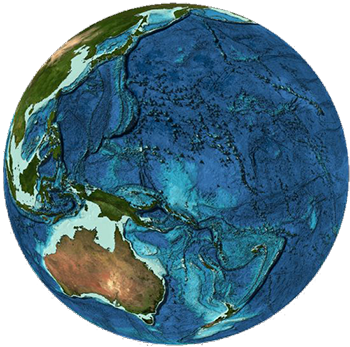sound·ing1
/ˈsoundiNG/
noun
plural noun: soundings
1. the action or process of measuring the depth of the sea or other body of water.
2. information or evidence ascertained as a preliminary step before deciding on a course of action

To know the ocean is to know the biology of the origin of life, the physiology of ourselves, the chemistry of cures and diseases, the geology of plate tectonics, volcanoes, and the earth’s core and crust, the physics of waves and currents, temperatures, and conditions in the water column that contribute to our food security, economy of our work, and the anthropology of our history and the art of our cultural traditions. To abandon science and to not know these things is a contradiction of what it means to be educated and engaged for the betterment of all human life.
How many times at ocean conferences and presentations have I heard someone exclaim: “We know more about Mars than we do the ocean!” Guilty myself, many times, as an expression of frustration about the imbalance in funding for ocean versus space research — literally billions to explore and land a vehicle on Mars and literally a pittance to explore and map the ocean floor.
The earth is more than 70% covered by water, and otherwise comprising an infusion found in our plants and animals, in our above and below ground waterways, and in our bodies. The ocean cycles and conveys that water and supports life above and below, in the water column, and into the geology, physics, chemistry, and biology of all habitats for all species. How can it be that we know so little about it?
Over the past decades, scientists have become obsessed with observation, enabled by new technologies like satellites and remotely operated underwater vehicles, by fixed installations and structures, buoys and submerged collectors that can capture a constant stream of data, represented on globes and projections then, charts and global positioning devices now. Sonar, a modern technology that can scan through the barriers of turbidity and depth in the ocean, can provide an incredibly detailed, accurate rendering of every nook and cranny of the sea floor, all the places for fish to breed, natural resources to be found, and submarines to hide.
There have been numerous independent efforts to coordinate and collect this information — networks of observation stations, programmed satellite monitoring, ships at sea in the trade routes, fishing boats, or research vessels in certain areas in search of specific information — all that have increased our knowledge to be sure, but a true, coordinated, comprehensive effort, planned for methodical survey has been difficult to sustain beyond such piecemeal progress.
Until now.
Financed by major support by the Nippon Foundation, a Japanese ocean research philanthropy, the General Bathymetric Chart of the Oceans (GEBCO), a project based in Monaco, has resolved to complete the full mapping of the world ocean by 2030 by coordinating all existing information, commissioning specific surveys of unexplored areas, and engaging public and private institutions and interests, nations and international associations, to combine existing data with related scientific expeditions, shipping itineraries, satellite controlled unmanned vessels, fishing fleets, and underwater drones and robots to record every hidden corner of the sea.
There is always the question: Why? Why do we pursue any knowledge really, the world seemingly understood well enough, progress risky, and resultant change uncertain? Oddly, these questions are being asked more often these days, an emerging, disconcerting distrust and dismissal of science that is finding its way into public media, education, and politics. The threat to “de-fund science” goes against what I would argue is the essential measure of human progress as over time we have inquired and investigated, theorized and experimented to discover answers to questions about how the world works that have advanced our well-being time and time again with no reason to doubt that such beneficial advancement will continue into the future.
Unless we stop asking the questions, and by so doing not caring to improve our lives and the lives of others, denying human curiosity and the civilizing value of inquiry.
To know the ocean is to know the biology of the origin of life, the physiology of ourselves, the chemistry of cures and diseases, the geology of plate tectonics, volcanoes, and the earth’s core and crust, the physics of waves and currents, temperatures, and conditions in the water column that contribute to our food security, economy of our work, and the anthropology of our history and the art of our cultural traditions. To abandon science and to not know these things is a contradiction of what it means to be educated and engaged for the betterment of all human life. So, I say to scientists and researchers, we need your knowledge — here on earth, even before such need on Mars. We need your data, analyses, conclusions, and suggestions about what and how to know more.
If we don’t know or don’t care about the ocean as an integrated and interconnected natural, financial, political, and social system, we are lost. Science is a method and a map to tell us exactly where we are, at least for now, until we know that it is time to ask ourselves again.
“Soundings: Mapping and Understanding the World Ocean” was originally broadcast as an audio episode on World Ocean Radio. It is part of the Earth Optimism Series, 24 posts profiling conservation actions and innovations to reduce our impacts on the planet. The Earth Optimism Series is brought to you by the World Ocean Observatory in partnership with the Smithsonian Institution’s Ocean Portal, to raise awareness of the Earth Optimism Summit during Earth Day weekend, April 21st through 23rd, 2017 in Washington DC and around the world. Read more solutions and success stories here and share your own ideas at earthoptimism.si.edu.



